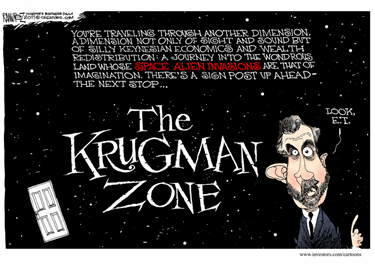Category Archive 'Paul Krugman'
23 Oct 2020


Paul Krugman, in the New York Times (which has replaced Mad Magazine in the humor section these days), inquires loudly: “How Many Americans Will Ayn Rand Kill?”
Even as New York contained its pandemic, however, the coronavirus surged out of control in other parts of the country. There was a deadly summer spike in much of the Sunbelt. And right now the virus is running wild in much of the Midwest; in particular, the most dangerous places in America may be the Dakotas. …
[W]hy does this keep happening? Why does America keep making the same mistakes?
Donald Trump’s disastrous leadership is, of course, an important factor. But I also blame Ayn Rand — or, more generally, libertarianism gone bad, a misunderstanding of what freedom is all about.
If you look at what Republican politicians are saying as the pandemic rips through their states, you see a lot of science denial. Gov. Kristi Noem of South Dakota, has gone full Trump — questioning the usefulness of masks and encouraging potential super-spreader events. (The Sturgis motorcycle rally, which drew almost a half-million bikers to her state, may have played a key role in setting off the viral surge.)
But you also see a lot of libertarian rhetoric — a lot of talk about “freedom†and “personal responsibility.†Even politicians willing to say that people should cover their faces and avoid indoor gatherings refuse to use their power to impose rules to that effect, insisting that it should be a matter of individual choice.
Which is nonsense.
RTWT
Personally, I’m hoping she knocks off all the looters and all the moochers, starting with Paul Krugman.
16 Jul 2015
 Paul Krugman Paul Krugman
05 Jun 2015


The Onion quotes a devastating report identifying yet another form of startling inequality resulting in large-scale social injustice in America.
According to the sobering report, the disproportionate distribution of soda-can wealth is greater than ever before, and has become one of the worst instances of economic inequality in the nation’s history. Data showed that over-salvaging of cans by a small and elite group of can-horders has created a steadily growing and possibly unbridgeable gap between the rich and the mega-poor.
“Although our nation’s upper middle class actually consumes the most beverages, a staggering percentage of these cans wind up in the hands of a very few,” said economist Cynthia Pierce, who worked as a consultant on the three-year, $14 million government study. “It’s a troubling trend. And as a tiny fraction of the population continues to maintain its stranglehold on redeemable can wealth, it’s a trend that shows no sign of slowing.”
According to Pierce, the study points to a distinct economic advantage for the most can-affluent—those who possess the resources necessary to collect, transport, separate, and accumulate more and more cans than the rest of the population.
“Members of this exclusive group come from exceedingly poor backgrounds and have access to outrageously low levels of education, which makes them much better prepared to reap the benefits of digging around in garbage,” Pierce added. …
One canned individual cited in the study is can tycoon Will Dorsey, a 33-year-old Detroit resident who spent his childhood living off the funds collected from his family’s vast can holdings. At the age of 16, Dorsey inherited five carts and dozens of garbage bags overflowing with recyclables when his father passed away unexpectedly one cold December morning.
According to economist and New York Times columnist Paul Krugman, people like Dorsey, who maintain an ultra-poor lifestyle that is vastly different from the rest of the population, are egregiously out of touch with the everyday economic realities of mainstream America.
“Dorsey is one of those select few who come from old can money,” Krugman said. “They’re just hoarding their assets so nobody else can benefit. And then they parade down the street with their carts full of recycling.”
Read the whole thing.
Hat tip to Lynn Chu.
27 Jul 2013

Jeffrey H. Anderson: Once again, Paul Krugman appears to have buried his head, ostrich-like, in a pile of New York Times.
29 Jun 2013

Dan Greenfield complains of being attacked by Paul Krugman: the same Paul Krugman, who has done for economics what Erich Von Daniken did for space exploration.
12 Jul 2012

Red Herring:
The growth of the Internet will slow drastically, as the flaw in “Metcalfe’s law“–which states that the number of potential connections in a network is proportional to the square of the number of participants–becomes apparent: most people have nothing to say to each other! By 2005 or so, it will become clear that the Internet’s impact on the economy has been no greater than the fax machine’s.
Hat tip to Walter Olson.
18 Jan 2012


Donald J. Boudreaux, at Cafe Hayek, makes a telling philosophical point about the inherent inconsistency of elite liberals’ obsession with inequality of income.
Paul Krugman agonizes [daily] over data that show high American income inequality. …
[W]hy focus on inequality of monetary incomes? What about other inequalities, such as the inequality of influence in public-policy debates? Mr. Krugman is certainly a one-percenter on this front. (Indeed, he’s a 0.001-percenter!)
Shouldn’t government ‘redistribute’ parts of Mr. Krugman’s New York Times column to me and other pundits who (according to the theory) can’t help but seethe with soul-shriveling envy at Mr. Krugman’s good fortune – good fortune that (also according to the theory) has less to do with Mr. Krugman’s merits as a columnist and more to do either with chance or with his pernicious and unfair influence with the Powers-that-Be?
Surely every ‘Progressive’ believes that those of us who now possess far less access than does Mr. Krugman to the opinion pages of the Times deserve to enjoy more of the access that he currently “controls.†And no ‘Progressive’ would let mere bourgeois obsessions with property rights and freedom block the state from forcibly redistributing such private property in the name of “social justice.â€
Sincerely,
Donald J. Boudreaux
Professor of Economics
George Mason University
Fairfax, VA 22030
Hat tip to Bird Dog.
07 Oct 2011


Paul Krugman wrote in the New York Times:
There’s something happening here. What it is ain’t exactly clear, but we may, at long last, be seeing the rise of a popular movement that, unlike the Tea Party, is angry at the right people. …
When the Occupy Wall Street protests began three weeks ago, most news organizations were derisive if they deigned to mention the events at all. For example, nine days into the protests, National Public Radio had provided no coverage whatsoever.
It is, therefore, a testament to the passion of those involved that the protests not only continued but grew, eventually becoming too big to ignore. With unions and a growing number of Democrats now expressing at least qualified support for the protesters, Occupy Wall Street is starting to look like an important event that might even eventually be seen as a turning point.
What can we say about the protests? First things first: The protesters’ indictment of Wall Street as a destructive force, economically and politically, is completely right.
Proving, once and for all, that our political opponents are not rational adults.
What we are dealing with is children, Walter-Mitty-role-playing in a fantasy filled with stereotyped images of mustache-twirling villains foreclosing Little Nell’s mortgage and sturdy workers and peasants protesting for land and bread.
What do you do with a Nobel Prize winner in Economics who thinks the American financial industry is “a destructive force?” I’d suggest calling the little men in the white coats to throw a net over the poor zany and carry him away for an extended rest period in the laughing academy.
How can you debate with insanity?
The haute bourgeois American left is so thoroughly invested in imaginary archetypes of injustice and oppression, of class struggle and revolutionary glory, that it looks at ordinary life, at people going to work in offices and doing conventional lawful business, and sees some kind of diabolical conspiratorial wrong-doing going on.
Its members look at their balding, pot-bellied establishment selves, sitting in expensive chairs in offices in some of the best real estate in the land, and they see youthful muscular workers and revolutionists getting ready to storm the Winter Palace.
These people are completely demented.
One fellow gets a degree in finance, writes some papers that make a splash, gets tenure, conducts some seminars, wins some prizes, and writes lots of angry editorials.
Another chap also gets a degree in finance, goes to work for a bank, writes the analyses used in some important deals, rises higher in management, receives some hefty bonuses, and isn’t angry with anybody.
So, the first guy is a righteous fighter for causes greater than himself, and the second guy is a fiend in human form who has climbed to the top over the corpses of the poor? What a crock!
I don’t take a lot of interest in the academic field of Economics. I majored at school in Philosophy. But I gather that, at some point in the past, Mr. Krugman did some worthwhile writing, offering useful explanations for the efficacy and service to humanity of trade and economies of scale. When you read him today, you seriously wonder if somebody has not dropped this poor man on his head.
But Paul Krugman is not alone. My college class is filled with similar upper middle class professionals, well-educated, affluent, and successful, who nonetheless have their heads full of bizarre prejudices against banks, corporations, “the rich” (artfully defined, of course, so as to exclude themselves) and with fantasy images of oppression, class warfare, and political struggle.
All I can say is, our educational system, which filled these whackos’ heads with all this nonsense, has a great deal to answer for.
I sometimes like to fantasize to myself what things would have been like if our colleges and universities and elite culture had been otherwise hijacked, not by the radical left performing its Gramscian long march through the institutions, but by nerds obsessed with Marvel comic books. Paul Krugman, for instance, would be editorializing from the perspective of Ironman or the Silver Surfer, not that of Piotr Kropotkin, hero of the workers’ revolution.
12 Sep 2011


Glenn Reynolds typically just does the best job of aggregating imaginable and merely points in the direction of something worth a read with a brief quotation or a witty one-liner.
Paul Krugman’s already infamous typo’d-editorial from yesterday clearly struck a nerve, because Professor Reynolds uncharacteristically actually took the time to swat him down.
Everybody’s angry, to judge from my email, about Paul Krugman’s typo-burdened 9/11 screed. Don’t be angry. Understand it for what it is, an admission of impotence from a sad and irrelevant little man. Things haven’t gone the way he wanted lately, his messiah has feet of clay — hell, forget the “feet†part, the clay goes at least waist-high — and it seems likely he’ll have even less reason to like the coming decade than the last, and he’ll certainly have even less influence than he’s had. Thus, he tries to piss all over the people he’s always hated and envied. No surprise there. But no importance, either. You’ll see more and worse from Krugman and his ilk as the left nationally undergoes the kind of crackup it’s already experiencing in Wisconsin. They thought Barack Obama was going to bring back the glory days of liberal hegemony in politics, but it turned out he was their Ghost Dance, their Bear Shirt, a mystically believed-in totem that lacked the power to reverse their onrushing decline, no matter what the shamans claimed.
Plus, a comment: “I’m not ashamed. If Dr. Krugman, and the circles he moves in, are ashamed then they’ve left us. 9/11 didn’t become a wedge issue because we left them.â€
08 Aug 2011

Don’t You Realize Paul Krugman on the Nobel Prize?
Posted at the Conservatory. link
02 Aug 2011


Paul Krugman is bummed.
Conan the Barbarian opined that it was “to crush your enemies, see them driven before you, and to hear the lamentation of their women.”
Republicans have not really crushed the democrats, and we may not exactly be seeing them driven before us, but they are certainly currently in retreat and disarray, and we do get to listen to the lamentations of their Krugman.
A deal to raise the federal debt ceiling is in the works. If it goes through, many commentators will declare that disaster was avoided. But they will be wrong.
For the deal itself, given the available information, is a disaster, and not just for President Obama and his party. It will damage an already depressed economy; it will probably make America’s long-run deficit problem worse, not better; and most important, by demonstrating that raw extortion works and carries no political cost, it will take America a long way down the road to banana-republic status. …
[T]he reported terms of the deal… amount to an abject surrender on the part of the president. First, there will be big spending cuts, with no increase in revenue. Then a panel will make recommendations for further deficit reduction — and if these recommendations aren’t accepted, there will be more spending cuts.
Make no mistake about it, what we’re witnessing here is a catastrophe on multiple levels.
It is, of course, a political catastrophe for Democrats, who just a few weeks ago seemed to have Republicans on the run over their plan to dismantle Medicare; now Mr. Obama has thrown all that away. And the damage isn’t over: there will be more choke points where Republicans can threaten to create a crisis unless the president surrenders, and they can now act with the confident expectation that he will.
In the long run, however, Democrats won’t be the only losers. What Republicans have just gotten away with calls our whole system of government into question.
Heh!
10 Mar 2010

I bet it would work on democrats, too.
Hat tip to Glenn Reynolds.
————————————————-
The federal government has nearly doubled the no-fly list since the Xmas bomb attempt.
————————————————-
“There goes my life’s work.” George Monbiot (the original moonbat) laments the impact of Climategate. The experts, he observes, are “Like squabbling evangelical churches in the 19th century, they can form as many schismatic sects as they like, nobody is listening to them any more.”
————————————————-
The recent New Yorker profile of Paul Krugman features some particularly fine examples of superbia.
“We were the only textbook that incorporated the financial crisis, as we were chronically late. We were supposed to have the manuscript delivered in August or September, and by October we were still working, and we just said, ‘We can’t send it out like this, too much is going on.’ We were really in nail-biting territory, because you have to get it to the printers by a certain date or you miss the academic year.â€
“We were right in the middle of that when the Nobel Prize committee called, and Robin’s reaction was ‘We don’t have time for this! …
“Paul is really averse to being drawn into a social network, to being groomed,†Wells says. “He doesn’t go to Washington because he doesn’t want to fall into that. As a spouse, you have your little list of things that you jokingly won’t forgive your spouse for. Right after he started writing for the Times and attacking George Bush, we got an invitation to have dinner with Paul Newman and his wife, but he wouldn’t go. And now he’s dead.â€
“It was inconvenient,†Krugman says. “I just don’t get any joy out of thinking, Oh, here I am with the movers and shakers. It would have required really discombobulating my schedule just to be able to say I’d had dinner with Paul Newman, and it’s not worth it.â€
————————————————-
Richard Murphy explains to his readers why he fights.
Tory parliamentary candidates have undergone training by a rightwing group whose leadership has described the NHS as “the biggest waste of money in the UKâ€, claimed global warming is “a scam†and suggested that the waterboarding of prisoners can be justified.
This is the reality of the libertarian right – openly hostile to humanity at large, embracing abuses of human rights, putting profits before else, contemptuous of the needs of the majority, denying facts when it suits them, seeking to destroy society as we know it, and wishing to make life for most considerably worse than it is now to advance their own enrichment.
That’s why I take them on here – and the bogus economics some of them use to support their arguments.
Your are browsing
the Archives of Never Yet Melted in the 'Paul Krugman' Category.
/div>

Feeds
|













